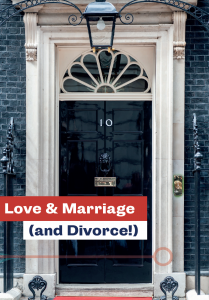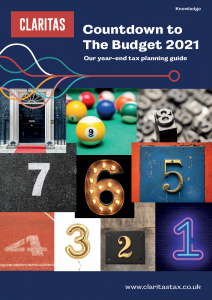Welcome to our 2021 year-end tax planning guide, aimed at getting you to think about the ways in which you might be able to make your tax future a little brighter.

2020 was, of course, a year like no other, and as we enter 2021 we are not yet out of the woods. That said, the tax wheel keeps on turning, and so long as there are assets, purchases, transactions and income to tax, the Chancellor will keep collecting his dues.
At the time of writing, we are waiting with bated breath for his promised Budget, delayed from November last year, presumably in expectation that a Spring budget might be at a time when those green shoots of recovery might be on their way.
So far that is looking doubtful, so it is anyone’s guess whether the Budget will actually deliver on any of the not-so welcome predictions that have been made over recent months. Whatever comes out of this Budget, it is clear that we will be paying for the cost of the pandemic for some years to come. Whether that takes the form of increases to capital gains tax, or even the introduction of a wealth tax – unthinkable even just s few years ago- remains to be seen.
No matter what happens, Claritas Tax are here to make things clear for you, even while we wait for that light at the end of the tunnel to return. We hope you enjoy reading this guide and find it a useful tool.
Here’s to 2022!

Straight in at number 10 is the little-known tax planning opportunity of getting married (including entering into a civil partnership).
To bring Jane Austen a little more up to date:
“It is a truth universally acknowledged that a single person, in possession of a good fortune, must be in want of a life partner in a recognised union that affords tax benefits“
Joking aside, there are a number of tax benefits that only come with marriage, which are perhaps not enough to outweigh the cost of the big day, but worth knowing about nonetheless.
First of all, being married can offer significant advantage for Capital Gains Tax (CGT) and Inheritance Tax (IHT) purposes, as transfers made between spouses do not normally give rise to a charge to either of these taxes.
Spousal exemption from IHT on death can be a particularly useful tax planning benefit.
Where the lowest earning spouse earns less than the Personal Allowance (£12,500 for 2020/21) and the highest earning spouse does not earn more than the basic rate band, you can claim Marriage Allowance.
This allows the lowest earning spouse to transfer £1,250 of their Personal Allowance for 2020/21 to the highest earning spouse, which can result in a reduction of up to £250 in the tax year.
While only likely to apply in limited circumstances, it is still free money available to those eligible.
Sometimes, things do go wrong, and planning for divorce can also be a tricky tax minefield.
While transfers between spouses attract favourable tax treatment, the point at which you cease to be a spouse could be earlier than you think, particularly for CGT purposes, where the relevant date is the date of separation.
While there are claims and elections that can be made to improve the position, particularly regarding the family home, always seek tax advice before making that divorce final.

A new entry at number 9, is the idea of giving cash or assets away to save tax. Radical you might think, but here are two ways in which you can save tax and feel good about yourself.
Giving to charity can make you feel good, but also make your tax return look good too.
Charities can reclaim basic rate tax from HMRC on qualifying donations, such that the amount you actually donate is grossed up by 20%, if you are a higher rate taxpayer, you get additional benefits as more of your income is taxed at basic rate instead of at the higher rate.
You could also consider accelerating any Gift Aid donations you are planning to make during 2021/22 to ensure they are made before 31 January 2022, rather than 5 April.
Donations made prior to filing your 2020/21 tax return can be treated as if they were made in the previous year to accelerate relief and/or maximise tax relief if, for example, you paid tax at a higher rate in 2020/21.
Alternatively, if you hold quoted shares, consider simply donating the shares. This has the double benefit of creating tax relief in the year of the donation and avoids triggering a CGT liability if the shares were to be disposed of at a gain.
While people are normally aware of the need to survive seven years if making gifts to avoid Inheritance Tax (IHT), there are occasions where this doesn’t apply.
Each year you can gift £3,000 free of IHT, and if you have not used the previous year’s amount, you can use that too.
In addition, there is a small gifts exemption of up to £250 per person per year, although if the £250 is breached, the whole amount becomes chargeable. There are also specific exemptions for gifts made in consideration of marriage, depending on your relationship.
Finally, there is an unlimited exemption from IHT on gifts made out of your normal income.
While there is no cap on this exemption, it is limited by the amount of your income, and HMRC will look at your income per year, and will certainly not accept income is carried forward for more than two years.
In addition, such gifts must be regular payments; while this does not have to be on an annual basis as a minimum, longer intervals between gifts will make it more difficult to prove.
Finally, the amount of the payment must not reduce your normal standards of living, and to evidence this, HMRC will ask for a list of your normal expenditure items and compare this with your income.
Particularly if started early, this can be a very effective way to shift considerable sums from your chargeable estate over time without an IHT charge.

Next on our list at number 8 are the tax planning opportunities available to employees.
“First of all, it’s canny tax planning in certain situations to get your employer to pay you less. Sounds counter-intuitive, but the less you earn, the lower your tax bill…”
Recognised salary sacrifice plans can be a tax efficient way to receive benefits from your employer rather than through salary, bonuses and/or dividends, which are likely to suffer higher rates of tax and which have a NIC cost on top.
However, swapping of only certain benefits are covered, such as pension contributions, cycle to work schemes, childcare and low emission cars (under 75 grams of CO2).
Sacrificing salary could be especially beneficial where the reduced pay amount would mean you don’t move into the next tax bracket (e.g. 40% or 45%), where it reduces an employee’s income below the £100,000 threshold to preserve personal allowances, or where salary would be reduced below thresholds for benefits e.g. the high income child benefit charge at £50,000.
Note, though, that for salary sacrifice to be effective the salary must really be sacrificed, which means that official earnings for things like mortgage applications or income-linked benefits could be based on that lower number.
Company cars are another area where savings could be made. Company car benefits can increase each year, even on the same car, so it is worth keeping an eye on the actual cost to your pocket. Rates for cars registered after 6 April 2020 can be lower than cars registered earlier. This is because the rating system used for CO2 emissions is changing to the new WTLP measure, so it is worth checking whether a newer model of your current car could end up costing you less.
If you are feeling particularly green, and you don’t fancy a completely tax-free employer-provided bicycle, you could go for an electric or hybrid car, where rates are based on the electric range of the car, and where benefit charges were as low as 2% for 2020/21.
If the car is fully zero-emission, the rate of benefit is currently 0%, so it might be worth considering as a tax-effective option.
If your employer pays for your private fuel, you will get stung with a fuel benefit in kind charge based on the car’s CO2 emissions.
In most cases, the taxable cost of the benefit outweighs the cost of actual fuel used so it may be worth calculating whether it would be better to reimburse your employer in full for any private usage.




